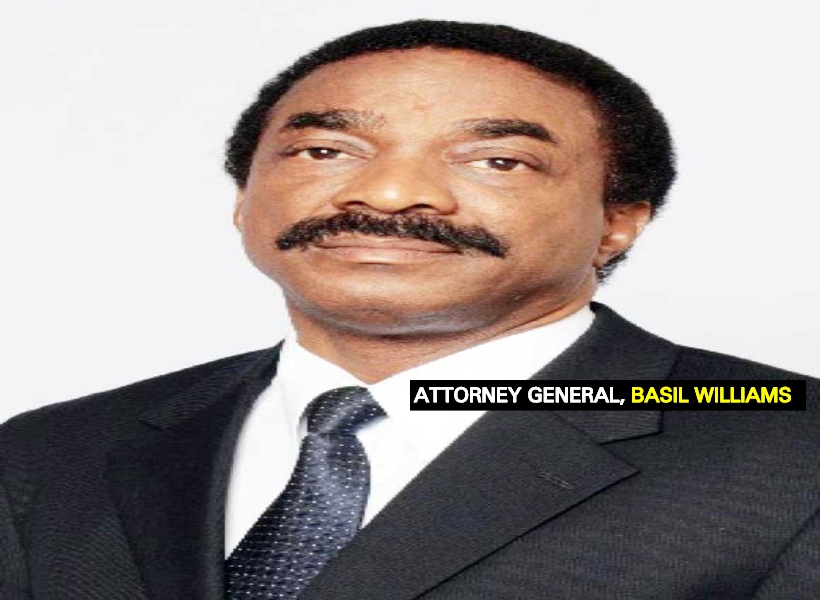Attorney General and Minister of Legal Affairs, Basil Williams S.C. has filed an appeal against a ruling by Justice Nareshwar Harnanan which essentially quashed a presidential respite, sparing Finance Minister Winston Jordan from 21 days’ imprisonment after he was held in Contempt of Court.

The case has its genesis from a 2015 Court ruling made by Justice Rishi Persaud in which he ordered Minister Jordan to pay a US$2.2M judgment to Trinidad construction company DIPCON; the sum was owed to the company for road constructions works done under the PPP/C administration.
Following years of unsuccessful litigation in the High Court, Appeal Court and Caribbean Court of Justice (CCJ), Minister Jordan was unsuccessful in having Justice Persaud’s ruling overturned; as such it remained enforced.
With regards to the monies, the Ministry of Finance only paid the company last year.
Chief Justice Roxane George had issued an Order of Mandamus directing that the judgment be paid to DIPCON on or before January 15, 2019. The monies were still not paid, and the company’s lawyer, Timothy Jonas, instituted Contempt of Court proceedings against the Finance Minister.
Following a Full Court hearing before Justice Priya Sewnarine-Beharry, the judge on June 24, last, held the Minister in Contempt of Court and ordered that he be imprisoned for 21 days if he failed to pay the monies to DIPCON on or before Monday, July 8, 2019.
The sum still was not paid. In an attempt to vacate the Contempt of Court order, the Attorney General then filed an appeal before the Full Court. That court comprising of Justices Simone Morris-Ramlall and Diana Insanally ruled that Williams’s application had no merit.
As such, the judges dismissed the appeal and rejected a stay of the contempt order that he was seeking to have.
It was then President David Granger invoked his powers under Article 188 (1) (b) of the Constitution of Guyana, pardoning his Minister of Finance from jail time.
Under Prerogative of Mercy at Article 188(1) (b) of the Constitution of Guyana, the President has the powers to issue such a grant of respite. According to Section 188 (1) The President may— (a) grant to any person concerned in or convicted of any offence under the law of Guyana, a pardon, either free or subject to lawful conditions; (b) grant to any person a respite, either indefinite, or for a specified period, of the execution of any punishment imposed on that person for such an offence.
DIPCON’s lawyer, then moved to the court to challenge the legality of the respite.
Jonas had argued that the President’s decision is so flawed in law that it amounts to nullity and is improper, unreasonable, irrational and ultra vires and in excess of jurisdiction. The lawyer further contended that no reason or respectable argument has been or can be advanced in support of the President’s decision.
Justice Harnanan in quashing the Presidential respite held that President Granger’s issuance of a respite for the Minister was not only unlawful but also arbitrary.
The judge also held that the President’s decision was an overreach into the province of the judiciary which had refused a stay of execution of the contempt order issued by his sister judge.
Further, Justice Harnanan said that the President’s action enables and perpetuates continued defiance by the State through its Minister of Finance, of Order of Court and of the provisions of the State Liability and Proceedings Act, by insulating the Minister against the lawful consequences of default and contempt.
According to the High Court judge, the President’s decision, “Perpetuates the default of the State of its obligations under the Orders by the High Court, Court of Appeal and the Caribbean Court of Justice (CCJ)”; and facilitates the continued deprivation of the fruits of the judgment, whilst leaving the successful litigant without any remedy or means to collect its lawful debt.”
Last week, the Attorney General filed a Notice of Appeal at the Court of Appeal. Williams wants the court to quash Justice Harnanan’s ruling on several grounds.
Williams, among other things, is contending that the judge erred in law in finding that the President’s decision to grant a respite after the refusal of a Stay of Execution of the Contempt Order, undermined the administration of justice and the rule of law and also it breached the separations of powers doctrine.
Further to that, he is arguing that the judge erred in law in finding that the decision of the President to grant a respite was an interference with the functioning of Parliament which had laid before it a Supplementary appropriations Bill to issue from the Consolidated Fund, as there was no nexus between the issuance of the respite and the Supplementary Appropriation Bill,
In addition, the Attorney General is also arguing that the judge erred by breaching the principles of the Separation of Powers in entering the province of the executive, especially in relation to the use of prerogative powers exercised by the Executive Arm of the state.
The court is yet to fix a date for hearing this matter.













